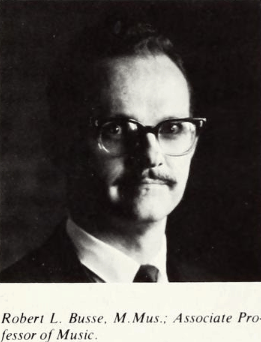
”So I’m thankful for the scars/ ‘Cause without them I wouldn’t know your heart/ And I know they’ll always tell of who you are/ So forever I am thankful for the scars.”- I Am They, “Scars”
“But he was wounded for our transgressions, he was crushed for our iniquities; upon him was the chastisement that brought us peace, and with his stripes we are healed.” Isaiah 53:5 (ESV)
I first met Professor Busse during the summer of 1968 as a participant in Concordia- River Forest’s inaugural Step One program. High school seniors selected for the program enrolled in a music theory or music history class, took lessons in their chosen instrument, and sang in the summer school choir.
Professor Busse taught the music theory class. With his trademark wit, he peppered his lectures with humorous asides that brought a dry subject to life. Furthermore, despite his extensive musical knowledge, Professor Busse never took himself – or anyone else- too seriously. For example, he referred to a famous organist of the era, E. Power Biggs, as E. Sour Pigs. Just think of Prof. Busse as Concordia’s version of P. D. Q. Bach!
However, Prof. Busse’s greatest legacy came after he suffered a debilitating stroke. Not one to throw in the towel, he learned to play piano works written for one hand. And, he found a way to continue his love of tatting. Today his tatting graces church altars and many homes. Above all, Prof. Busse never said good-bye. Instead, he cheerfully waved, “See you in Madagascar!”
Therefore, your confession that you’re thankful for the scars potentially represents a big spiritual turning point. An aha moment. In his book Done With That: Escaping the Struggle of Your Old Life, Pastor Bob Merritt identifies three prior moments to move you from your old life to your new life. Those three moments = identify your signature sin, purify what flows into your mind, and avoid the middle. But, the biggest aha moment (a) feels so incredible you can’t imagine life without it and (b) if often triggered by pain, loss, or uncertainty – leaving you desperate to hear from God.
Most noteworthy, you must decide to put yourself in a posture to hear from God. Even though you don’t know whether anything will happen, you open your heart to him. In fact, Pastor Merritt believes. God’s smaller nudges should occur on a daily basis. Such impressions may arrive as an insight, encouragement, conviction, or simply a sense of God’s presence and love.
Finally, Pastor Merritt shares four practices or disciplines he’s found that open up the channels for God’s Word to speak:
- Read God’s Word. When you read the Bible, you give God a chance to speak to you – with amazing regularity. If you skip reading for a few days, though, you tend not to receive insights from God.
- Read inspiring books. In other words, don’t rely on mind-numbing, worldly distractions as your default source of solace and comfort. Rather, set your mind on things above (Colossians 3:2).
- Reduce the noise in your life. Hence, intentionally structure your day to include quiet time. When you do so, that enables you to tune in and hear God’s messages more clearly.
- Confess your sins. While this practice tends to make people uncomfortable, ,unconfessed sin functions as a barrier to hearing from God.
Pastor Merritt exhorts:
“God wants to bring every person through a spiritual turning point . . . to fill our lives with an ever-flowing abundance of His love — not just for ourselves, but for the watching world. Because when other people hear about what God did for us, many will run down the same path to discover for themselves whether what happened to you could also happen to them.”
Thanks, Professor Busse, for your resolute response to life’s scars. I’ll see you in Madagascar!


